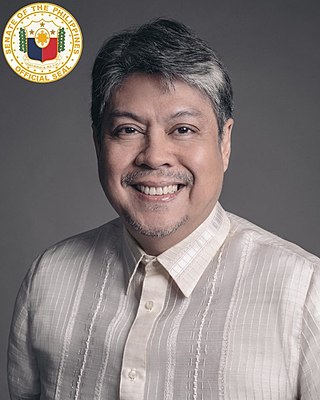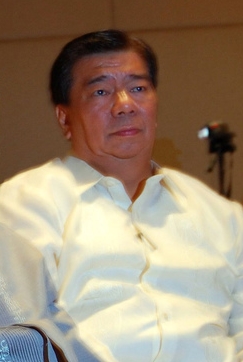
Elections for all positions in the Philippines above the barangay were held on May 10, 2010. The elected president is Benigno Aquino III, the 15th President of the Philippines, succeeding President Gloria Macapagal Arroyo who was barred from seeking re-election due to term restrictions. The successor of Vice-President Noli de Castro is Jejomar Binay, the 13th Vice President of the Philippines. The legislators elected in the 2010 elections joined the senators of the 2007 elections and comprised the 15th Congress of the Philippines.

The 2010 Philippine presidential and vice presidential elections were held on Monday, May 10, 2010. The incumbent President of the Philippines, Gloria Macapagal Arroyo, was ineligible to seek re-election as per the 1987 Constitution, thus necessitating an election to select the 15th President.

The 2010 election of members to the Senate of the Philippines was the 30th election to the Senate of the Philippines. It was held on Monday, May 10, 2010, to elect 12 of the 24 seats in the Senate. The winners in this election joined the winners of the 2007 election to form the 15th Congress of the Philippines. The senators elected in 2007 will serve until June 30, 2013, while the senators elected in this election will serve up to June 30, 2016. The 2010 presidential election, elections to the House of Representatives as well as local elections occurred on the same date. The Philippines uses plurality-at-large voting for seats in the Senate: the twelve candidates with the highest number of votes wins the twelve seats up for election.

Elections were held in Central Luzon for seats in the House of Representatives of the Philippines on May 10, 2010.

The 2010 House of Representatives of the Philippines party-list election was on May 10, 2010. The whole country was one at-large district, where parties nominate three persons to be their candidates, ranked in order of which they'll be seated if elected. The elected representatives will serve in the 15th Congress.
Opinion polling for the 2010 Philippine presidential election is managed by two major polling firms: Social Weather Stations and Pulse Asia, and several minor polling firms. The polling firms conducted surveys both prior and after the deadline for filing of certificates of candidacies on December 1, 2009.

The following is the official canvassing of votes by the Congress of the Philippines for the 2010 Philippine presidential and vice presidential election. The canvassing, originally scheduled to start on May 31, started on May 25, 2010, and ended on June 9, 2010. The Congress is mandated to declare a winner 30 days after the elections.
The 2010 presidential campaign of Benigno Aquino III, then Philippine Senator, began when he announced his candidacy for the presidency of the Philippines at the Club Filipino, Greenhills, San Juan, Metro Manila, on September 9, 2009, 40 days after the death of his mother, former President Corazon Aquino. On September 21, 2009, Aquino's campaign announced that Senator Mar Roxas would be his vice presidential nominee.

The 2007 election of members to the Senate of the Philippines was the 29th election to the Senate of the Philippines. It was held on Monday, May 14, 2007, to elect 12 of the 24 seats in the Senate. The winners in this election joined the winners of the 2004 election to form the 14th Congress of the Philippines. The senators elected in 2004 will serve until June 30, 2010, while the senators elected in this election will serve up to June 30, 2013. The elections to the House of Representatives as well as local elections occurred on the same date. The Philippines uses plurality-at-large voting for seats in the Senate.

The 2013 election of members to the Senate of the Philippines was the 31st election to the Senate of the Philippines. It was held on Monday, May 13, 2013, to elect 12 of the 24 seats in the Senate. The winners in this election joined the winners of the 2010 election to form the 16th Congress of the Philippines. The senators elected in 2010 will serve until June 30, 2016, while the senators elected in this election will serve up to June 30, 2019. The elections to the House of Representatives as well as local elections occurred on the same date. The Philippines use plurality-at-large voting for seats in the Senate: the twelve candidates with the highest number of votes win the twelve seats up for election. The Senate seat vacated by President Benigno Aquino III in 2010 was among the twelve seats to be put for election.
Opinion polling is carried out by two major polling firms: Social Weather Stations (SWS), and Pulse Asia, with a handful of minor polling firms.

Local elections were held in Manila on May 13, 2013, within the Philippine general election. The voters elected for the elective local posts in the city: the mayor, vice mayor, the six congressmen, and the councilors, six in each of the city's six legislative districts.
These are the people who, at one time or another, had been considered, announced, declined or withdrew his or her candidacy in the 2013 Philippine Senate election.
Opinion polling for the 2013 Philippine Senate election is carried out by two major polling firms: Social Weather Stations (SWS), and Pulse Asia, with a handful of minor polling firms. A typical poll asks a voter to name twelve persons one would vote for in the senate election. The SWS and Pulse Asia's surveys are usually national in scope, while other polling firms usually restrict their samples within Metro Manila.

The 2016 election of members to the Senate of the Philippines was the 32nd election of members to the Senate of the Philippines. It was held on Monday, May 9, 2016, The seats of 12 senators elected in 2010 were filled during this election. The winners in this election joined the winners of the 2013 election to form the 17th Congress of the Philippines. The senators elected in 2013 served until June 30, 2019, while the senators elected in this election would serve up to June 30, 2022.
This is a list of candidates in the 2016 Philippine presidential and vice presidential elections.

The 2019 election of members to the Senate of the Philippines was the 33rd election of members to the Senate of the Philippines for a six-year term. It was held on May 13, 2019.
Opinion polling, locally known as surveys, in the 2016 Philippine presidential and vice presidential elections is conducted by Social Weather Stations (SWS), Pulse Asia, and other pollsters. The last electoral votes were cast on Monday, May 9, 2016.
In most polls (surveys) for the Senate, a respondent is given the option to give up to 12 names.
The 2025 Philippine Senate election will be the 35th election of members to the Senate of the Philippines for a six-year term. It will be held on May 12, 2025, within the 2025 general elections.










